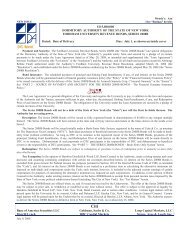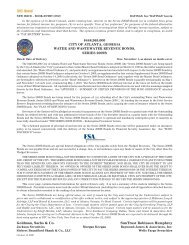Cleveland Clinic Health System Obligated Group - FMSbonds.com
Cleveland Clinic Health System Obligated Group - FMSbonds.com
Cleveland Clinic Health System Obligated Group - FMSbonds.com
You also want an ePaper? Increase the reach of your titles
YUMPU automatically turns print PDFs into web optimized ePapers that Google loves.
SGR system annually takes into account changes in the Medicare fee-for-services enrollment, input prices, spendingdue to law and regulation, and gross domestic product, effectively changing the RBRVS on an annual basis. Thereis no guarantee that reimbursement under RBRVS will cover the <strong>Obligated</strong> <strong>Group</strong>’s actual costs of providingphysician services to Medicare beneficiaries.Payments to physicians who opt not to participate in Medicare are paid by Medicare at lower levels thanpayments to participating physicians. Regardless of physician enrollment status, all physicians who furnish healthcare services to Medicare beneficiaries must meet the full gamut of federal coding, documentation and other<strong>com</strong>pliance requirements. In general, the professional staff members of the <strong>Obligated</strong> <strong>Group</strong> are participatingphysicians in the Medicare program.Hospice PaymentsHospice services are paid on a cost-based prospective payment method, subject to a “cap” amount. CMSestablishes daily payment amounts, which are adjusted to reflect local differences in wages, to reimburse fourcategories of covered hospice care: routine home care; continuous home care; inpatient respite care; and generalinpatient care. Under the BBA and BBRA, the amount paid for hospice services will be less than the market basketincrease for the fiscal year involved. Payments to a hospice for general inpatient care are subject to a limitation onthe number of days of inpatient care furnished to Medicare patients. During the 12-month period beginningNovember 1 of each year and ending October 31, the aggregate number of inpatient days (both for general inpatientcare and inpatient respite care) may not exceed 20 percent of the aggregate total number of days of hospice careprovided to all Medicare beneficiaries during that same period. This limitation is applied once each year, at the endof the hospices’ “cap period” (November 1 to October 31).Outpatient Renal Dialysis PaymentsRenal dialysis services are reimbursed on the basis of a prospective payment amount, although differentrates are paid for hospital-based and freestanding facilities, and are adjusted for geographic differences in laborcosts. In an effort to provide an incentive for home dialysis, the <strong>com</strong>posite rate is the same regardless of whether thetreatment is furnished in the facility or in the patient’s home and must be accepted by the facility as payment in fullfor covered outpatient dialysis. There can be no assurance that the amount received by the <strong>Obligated</strong> Issuers forthese services will be sufficient to cover their costs to provide these services.Provider-Based StandardsThe Medicare program pays certain facilities and services, including, for example, SNFs and physicianoffices and clinics, differently depending upon whether they are “provider based” or “freestanding.” A “providerbased” facility or service is an integral part of another provider, such as a hospital. Certain administrative costs andoverhead of the provider organization may or must be allocated in part to the provider-based entity. In addition,provider-based designation can result in additional Medicare payments for services furnished at the provider-basedlocation and also may increase the co-insurance liability of Medicare beneficiaries for those services.“Freestanding” providers are not considered part of another provider under the Medicare program and stand on theirown for purposes of Medicare payments. For any given facility or service, it is probable that classification as“provider based” will result in higher aggregate Medicare payments for a hospital system as a whole.Effective October 1, 2002, the mandatory requirement to obtain provider based designation was replacedwith a voluntary attestation process. Nevertheless, providers may elect to obtain a determination of provider basedstatus prior to billing in that manner, thereby eliminating the risk of incorrect billing and reimbursement for servicesprovided to Medicare beneficiaries. Management of the <strong>Obligated</strong> Issuers believes that all facilities or services,which currently are or have been treated as provider-based, met and continue to meet all applicable criteria for suchdesignation. However, should a determination be made to the contrary, reclassification of entities now characterizedas “provider-based” to “freestanding” may adversely affect those entities’ payments under the Medicare Programand could make them liable for Medicare overpayments.26




